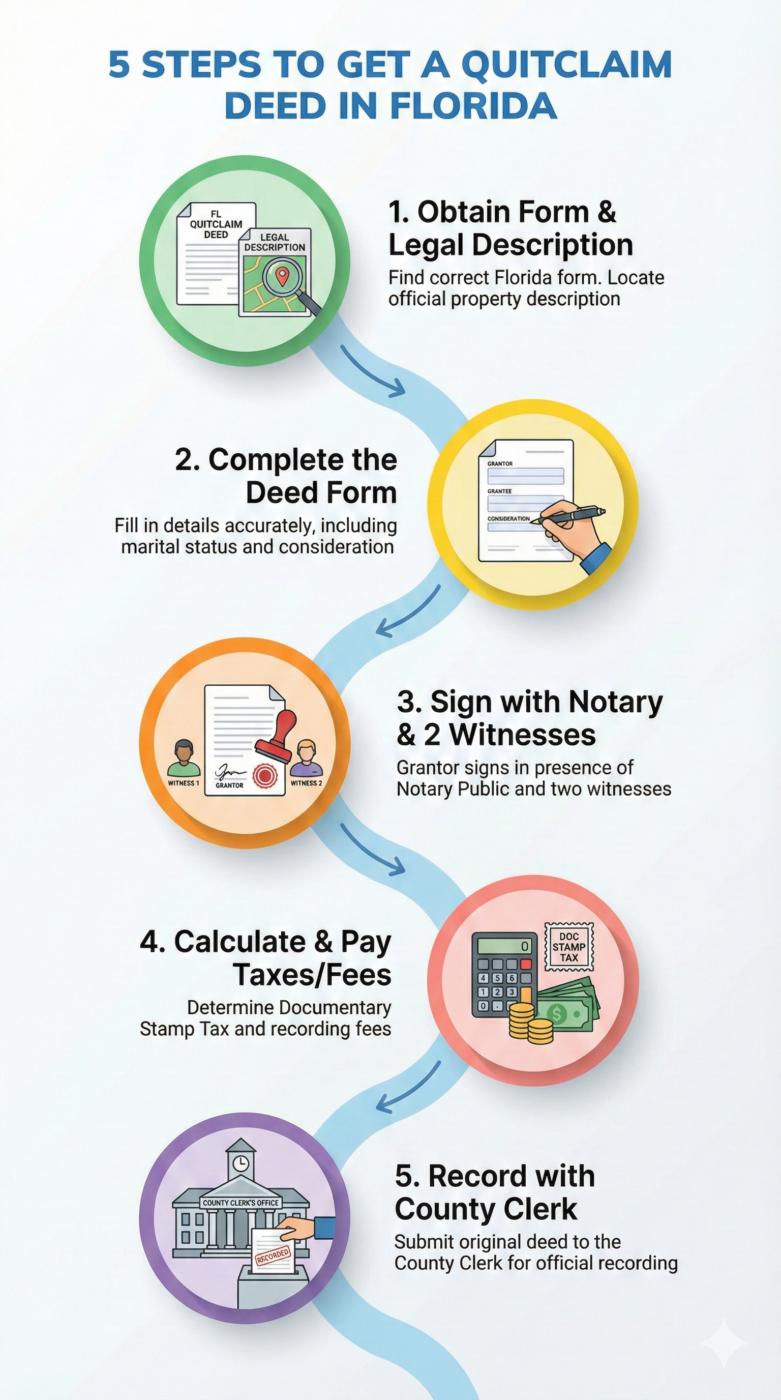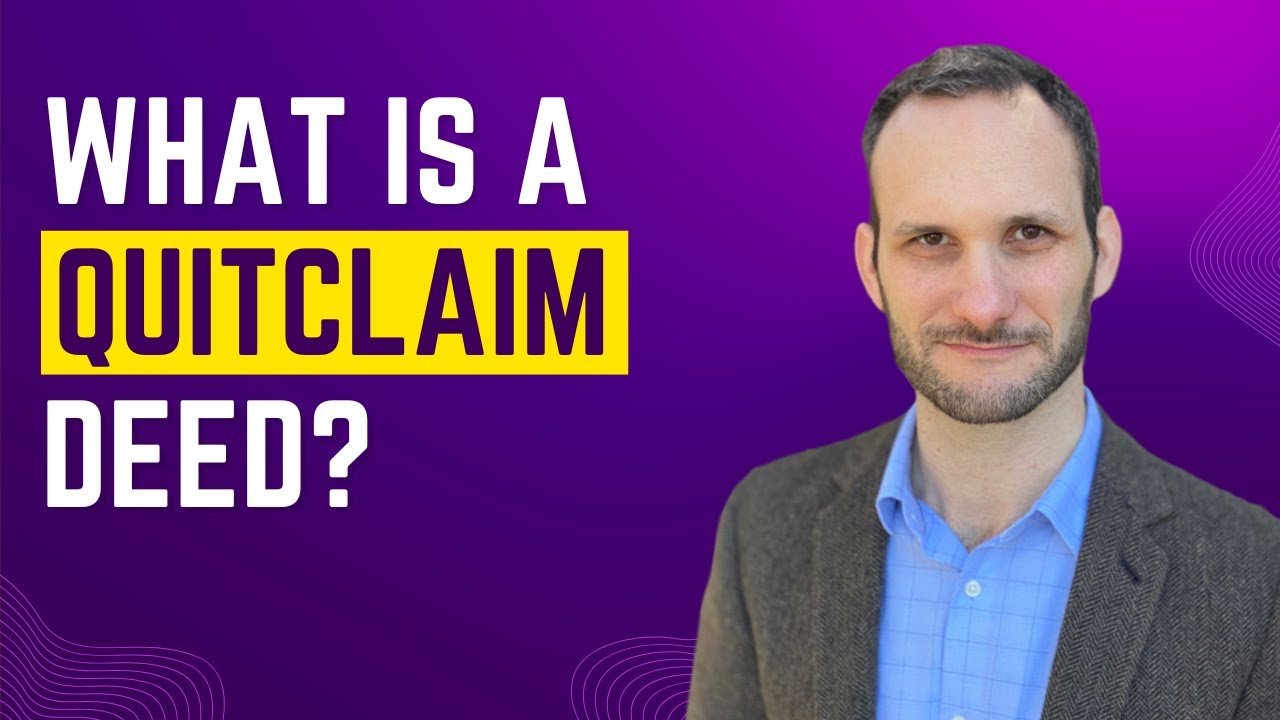Florida Quitclaim Deed: Requirements, Process & Forms
A Florida quitclaim deed is a legal document used to transfer property ownership from one person (the grantor) to another (the grantee) with no warranties of title. It is the fastest and most common way to transfer property between family members, spouses, or into a living trust in Florida.
However, because it offers no guarantee that the property is free of liens or claims, it is rarely used in traditional real estate sales.
Quick Summary: Florida Requirements
To be legally valid in Florida, a quitclaim deed must meet these specific standards (Florida Statute § 695.26):
- Grantor & Grantee: Full legal names and addresses of both parties.
- Legal Description: The precise legal description of the property (not just the address), typically found on the previous deed.
- Signatures: Signed by the grantor in front of a notary public and two witnesses.
- Recording: Filed with the Clerk of the Circuit Court in the county where the property is located.
How to File a Quitclaim Deed in Florida
If you are looking to transfer property, follow this step-by-step guide to ensure your deed is recorded correctly.
1. Obtain the Legal Description
You cannot simply write the street address. You must use the “Legal Description” of the property. You can find this on the current deed or by searching the County Property Appraiser’s website. It often looks like: “Lot 4, Block B, of Sunshine Estates, according to the plat thereof…”
2. Draft the Quitclaim Deed Form
You can use a standard form or have an attorney draft one. The document must state that the Grantor “remises, releases, and quitclaims” the interest to the Grantee.
- Tip: If the Grantor is married and the property is their homestead, their spouse may need to sign the deed even if the spouse is not on the title.
[Download a Free Florida Quitclaim Deed Form (PDF)] (Note: This is a general template. It does not include specific vesting clauses, spousal waivers, or life estate language.)
3. Execute the Deed (Signing Requirements)
This is where some people make mistakes. In Florida, the signing must be done strictly:
- The Grantor must sign in the presence of two witnesses and a notary public.
- The witnesses must sign the deed.
- The notary must acknowledge the signature and stamp the deed.
4. Calculate and Pay Documentary Stamp Taxes
Before recording, you must pay the Florida Documentary Stamp Tax.
The tax is $0.70 for every $100 of “consideration” (money paid). However, in Miami-Dade County, the rate is $0.60 per $100 for single-family residences.
Mortgages count as consideration. If you transfer a property that has a mortgage, you must pay taxes on the outstanding mortgage balance, even if no money changes hands.
For example, suppose you quitclaim a house worth $500,000 to your brother for free, but it has a $200,000 mortgage. You owe doc stamps on the $200,000 ($1,400 in taxes).
5. Record the Deed
Take the original signed deed to the records office in the county where the property is. Recording fees are typically $10.00 for the first page and $8.50 for each additional page.

How Much Does a Quitclaim Deed Cost?
The total cost of a quitclaim deed consists of two parts: the legal preparation fee and the county filing fees.
1. Attorney Preparation Fee ($400)
Our firm charges a flat fee of $400 to prepare a Florida quitclaim deed.
We draft the legal description and formatting to ensure it meets Florida Statute § 695.26, guide you through the signing requirements (witnesses/notary), and calculate the exact documentary stamp taxes to prevent you from overpaying or triggering an audit.
2. Government Recording Fees (Paid to County)
These are fixed costs charged by the Clerk of Court in your county:
- Recording Fee. Approximately $18.50 (for a standard 2-page deed).
- Documentary Stamp Taxes. If there is no mortgage, the tax is minimal (usually $0.70). If there is a mortgage, you pay $0.70 per $100 of the outstanding mortgage balance transferred.
Common Use Cases
Removing a Spouse After Divorce
One of the most common uses of a quitclaim deed in Florida is to remove an ex-spouse from title following a divorce decree or a marital settlement agreement (MSA).
Note: a quitclaim deed transfers ownership (title), but it does not transfer debt. You must refinance the mortgage into your name alone to fully remove your ex-spouse from financial liability.
Do you pay taxes on a divorce transfer? No, if the property was your homestead. Transfers of homestead property between spouses incident to a divorce are exempt from Florida documentary stamp taxes, provided the transfer is recorded within one year of the divorce decree.
Adding a Spouse or Family Member
Many Florida homeowners use a quitclaim deed to add a new spouse or adult child to the title. Here are the steps:
- Get the Current Deed. You need the exact “Legal Description” of the property from your current deed (not just the street address).
- Draft a New Quitclaim Deed. For grantors, list yourself (and your spouse if currently married). For grantees, list yourself and the person you are adding.
- Include Vesting Language. To ensure the property passes automatically to them if you die, use the phrase “as Joint Tenants with Rights of Survivorship” (for family) or “a married couple” (for spouses).
- Sign Correctly. You (the Grantor) must sign in front of two witnesses and a notary public. The Grantee does not sign.
- Record. File the deed with the County Clerk and pay the recording fees and any required taxes.
Note: If the property is your homestead, your spouse must sign the deed to “waive” their homestead rights, even if they are not being added to the title.
Adding a family member is not free if there is a mortgage. You must pay documentary stamp taxes on half the mortgage balance if adding one person.
For example, suppose you have a $300,000 mortgage. You add your new spouse to the deed. You owe taxes on $150,000. That is a $1,050 tax bill you must pay to the county.
We prepare deeds for clients throughout Florida.
We charge a flat fee for a consultation and preparation of your quitclaim deed. Our attorneys can do everything remotely by phone or Zoom.
In over 30 years, Alper Law has helped thousands of clients with real estate transfers.

Quitclaim Deed vs. Warranty Deed vs. Lady Bird Deed
Why choose one over the other?
If your goal is to pass your home to your children after you die to avoid probate, a standard quitclaim deed is often a mistake.
With a quitclaim deed, you lose ownership now. You cannot sell the home later without their permission.
With a lady bird deed, you keep the home (and homestead benefits) for your life. It automatically transfers to your heirs upon death. You retain the right to sell or change your mind at any time without their permission.
Common Risks & Mistakes
1. Title Defects
Because a quitclaim deed makes no warranties, it does not “fix” title issues. If there is an unknown lien on the property, the new owner inherits that lien. This is why title insurance is impossible to get on a quitclaim transfer without a new title search.
2. DIY Errors
Florida is strict about the “two witnesses” rule. If a deed is recorded without two witness signatures, it is technically voidable and causes massive headaches (“clouds on title”) when you eventually try to sell the property.
Frequently Asked Questions
Does a quitclaim deed legally transfer ownership?
Yes, it transfers whatever ownership interest the grantor has. However, it does not guarantee that the grantor owns the property free and clear.
Can I file a quitclaim deed myself in Florida?
Yes, legally you can. However, due to strict mortgage signing requirements and tax calculations, errors are common.
How much does it cost to file a quitclaim deed in Florida?
The recording fee is usually around $18.50 (for a two-page deed). However, the Documentary Stamp Tax can be significant if the property has a mortgage.
Does a quitclaim deed remove a name from the mortgage?
No. A quitclaim deed only affects the deed (ownership), not the debt. If you quitclaim your interest to your ex-spouse, you are still legally responsible for the mortgage unless you refinance.
Sign up for the latest information.
Get regular updates from our blog, where we discuss asset protection techniques and answer common questions.









